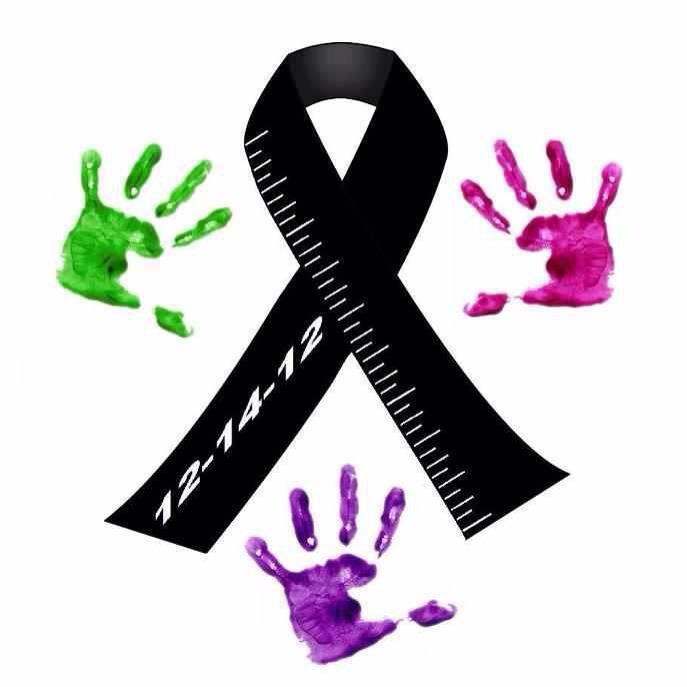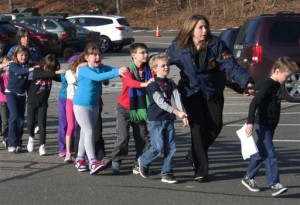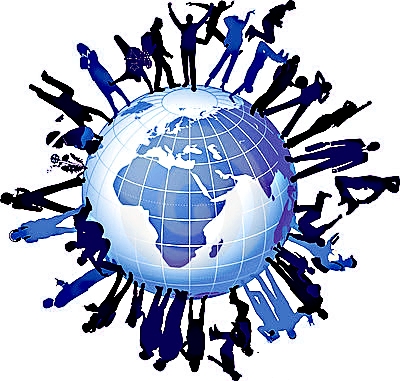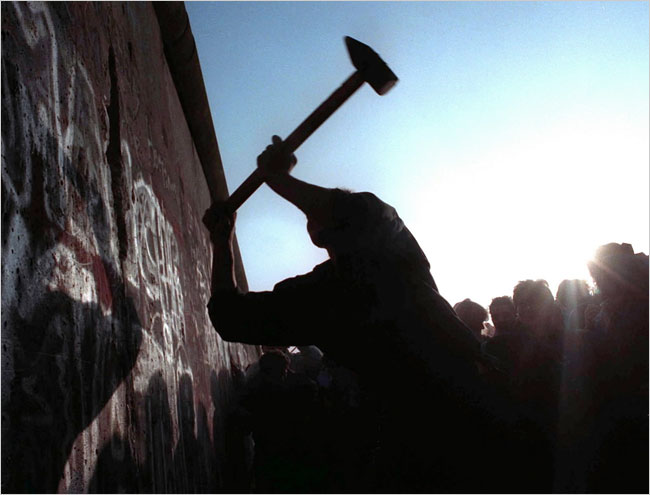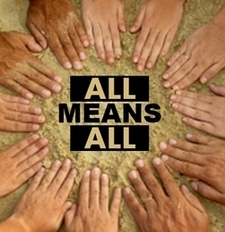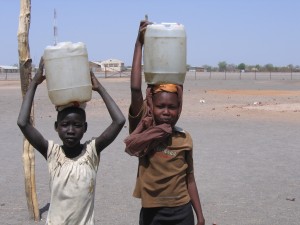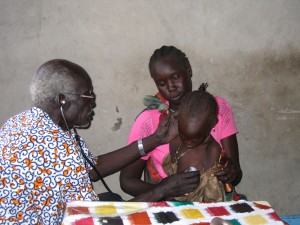Gaudete Sunday at Emmanuel Episcopal Church, Staunton, Va., 16 December 2012.
Today, my friends, is Gaudete Sunday, the Third Sunday in Advent on which we are called to rejoice in the Lord.
The Prophet Zephaniah tells us to rejoice and exult with all our hearts, for the Lord has taken away the judgments against us.
The Prophet Isaiah tells us to ring out our joy, for surely it is God who saves us … to sing the praises of the Lord for he has done great things, and this is known in all the world.
The Apostle Paul tells us to rejoice in the Lord always, again I will say, Rejoice, for the Lord is near, and the peace of God, which surpasses all understanding, will guard our hearts and minds in Christ Jesus.
And yet …
We come to church this morning, on Gaudete Sunday, with heavy hearts, scared, grieving, and crying out, “How long, O Lord, how long … before all the killing stops?”
We come to church this morning, on Rejoicing Sunday, not knowing how to rejoice, because we are still weeping.
I tell you, the only way we can rejoice this day is if we listen to John the Baptist, who tells us exactly what we need to do to move from fear to courage, from sadness to joy, from weeping to laughter.
John, who has just accused all those who come to him for baptism of being a brood of vipers, tells the people: “You want to make the world a better place? It’s not rocket science!” (OK, he didn’t say just like that) “In fact, it’s pretty darned easy. Share what you have … don’t be greedy … don’t be mean.”
In fact, if you fast forward 2,000 years, you hear the exact same advice from Robert Fulghum, who wrote the seminal book, All I Need to Know I Learned in Kindergarten. Do you know that book?
His lessons are simple:
•Share your cookies.
•Hold hands crossing the street.
•Be kind to little old ladies.
As I said, it is not rocket science.
And yet, this morning, it is hard, isn’t is?
Because on Tuesday, we had shootings in Oregon.
On Thursday, we had a young man threaten to shoot his fellow students and blow up a school in Oklahoma – thankfully, a fellow student told the school counselor, and on Friday, that boy with a murderous rage was arrested before he could act.
On Friday, we had the tragedy at Sandy Hook Elementary School – with 20 children, six teachers and school administrators, the shooter’s mother and the shooter himself killed.
Last night in Newport Beach, California, we had a man fire 50 shots at a mall – thankfully, only into the air and down into the ground. No one was injured, thanks be to God. But the man, who apparently was seeking attention, got the full attention of the police and is now in custody.
And that is just this week.
As we mourn for Newtown, Connecticut, we also mourn for the victims of other shootings we remember: Columbine; Kentucky; Scotland; the Netherlands; Kansas; Virginia Tech; California; Germany; Minnesota; Florida; Illinois; Texas; Brazil; Alabama; Indiana; Ohio; Iowa; Richmond; Georgia; Arkansas;[1] … alas, the list goes on and on …
We mourn those whose lives were lost, those who lost loved ones; those who were injured; those who have been traumatized …
And we wonder, “What will it take to stop this madness?”
The Sufi tell a story:
Past the seeker, as he prayed, came the crippled and the beggar and the beaten. And seeing them, the holy one went down into deep prayer and cried, “Great God, how is it that a loving creator can see such things and yet do nothing about them?”
And out of the long silence, God said, “I did do something about them. I made you.”[2]
And that, my friends, is exactly what we need to hear this morning. For we are the ones who can make the madness stop. We, who were created in the very image of God, over whom God rejoiced after creating us, proclaiming that at last, creation was very good, we who have been given dominion over the earth (better understood as “stewardship” of creation), we are the ones who are called to be partners with God in caring for God’s creation.
We are the ones upon whom God depends to care for those in need, to love, to create peace and live peace …
Because the Sufis are right: God did do something about all the evil in the world. God created us.
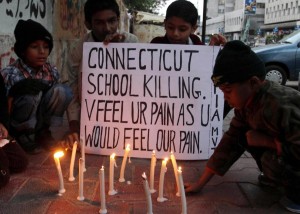
Pakistanis children - many of whom live in fear of violence in their own lives - hold a candlelight vigil for the victims in Newtown.
So … on this Gaudete Sunday, when the prophets reiterate God’s promises to us, and assure us that God saves us, when the Apostle tells us to rejoice …. this is the day we need to make the commitment to do whatever it takes to model God’s love, to live God’s love, every moment of our lives.
We live in a country, my friends, in which there are more places to buy guns than there are Starbucks. We live in a country with 311 million people and a reported 281 million registered guns.[3] 281 million registered guns. We live in a country in which it is easier for me to buy a gun than it is for me to buy a car. Or get a driver’s license. Or buy a house.
I don’t know what kind of conversation we need to have in this country, but the time is now — it is NOW — for us to stand up and say, “Enough! We have had enough!” We cannot afford to wait until all the mourning is done – for it will never be done. We should not wait until all the memorial services and funerals are over – for they never end for the families and loved ones.
Now is the time for us to listen to John the Baptist, who tells us to share what we have, to not be greedy, to be satisfied with our honest wages, to not be mean.
Now is the time for us to listen to Robert Fulghum, who tells us to share our cookies, to hold hands while crossing the street, to be kind to little old ladies.
We are in Advent. We are waiting for the Second Coming of Christ
I can tell you: I do not believe the Risen Lord will come again as long as we refuse to live as God created us to live, in love and community. I do not believe that as long as we celebrate our individual rights to the point that our communities are ravaged by violence and death, that God is willing to come back again.
Yes, there is suffering in the world.
But God created us to do something about it!
We can rejoice – as long as we are willing to do the things that need to be done. To love – and live – kindness. To do justice. And to walk humbly with our God.
Now is the time for us to step up and do our part …
This is not someone else’s job …
It is ours.
So perhaps as we move through these last nine days of Advent, perhaps we can figure out – and begin doing – what it is that God has called us to do.
• • •
Daniel Barden, 7
Olivia Engel, 6
Josephine Gay, 7
Ana M. Marquez-Greene, 6
Dylan Hockley, 6
Madeleine F. Hsu, 6
Catherine V. Hubbard, 6
Chase Kowalski, 7
Jesse Lewis, 6
James Mattioli, 6
Grace McDonnell, 7
Emilie Parker, 6
Jack Pinto, 6
Noah Pozner, 6
Caroline Previdi, 6
Jessica Rekos, 6
Avielle Richman, 6
Benjamin Wheeler, 6
Allison N. Wyatt, 6
Rachel DaVino, 29
Dawn Hochsprung, 47
Anne Marie Murphy, 52
Lauren Rosseau, 30
Mary Sherlach, 56
Victoria Soto, 27
Nancy Lanza, 47
Adam Lanza, 20
Now is the time … as faith-filled lovers of God … to say, “Enough. Is. Enough.” And to act to make that come true.
Those children? Those teachers? That principal?
They are counting on us.
Just as God is counting on us …
to do something.
We can start by sharing our cookies, holding hands while crossing the street, being kind to little old ladies.
It is not rocket science.
It is what we were created to do.
Amen.
[1] http://left.wikia.com/wiki/School_Shooting_Timeline
[2] Ernest Kurtz and Katherine Ketcham, The Spirituality of Imperfection: Storytelling and the Search for Meaning (New York: Bantam Books, 1993, Kindle edition), Kindle location 1549.
[3] NBC News reports, Friday, 14 December 2012.
